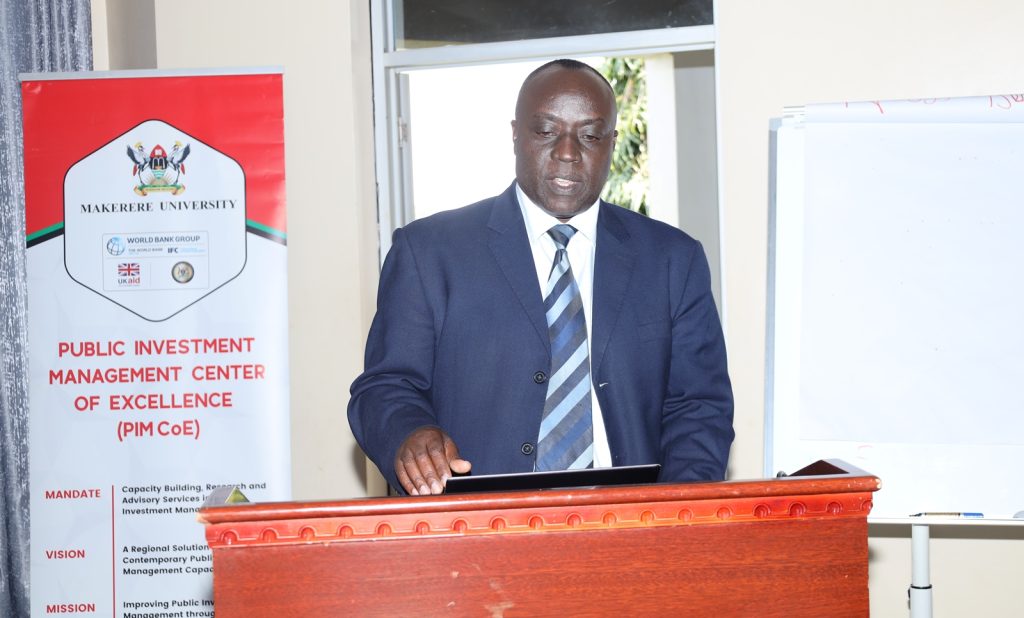
PIM Centre Makerere, Graduates Second Cohort of Certificate in Financial Implications – Integrated Regulatory Cost-Benefit Analysis
Thirty-one government officers from Ministries, Departments, and Agencies (MDAs) have successfully completed a two-week intensive training in the Certificate of Financial Implications (CFI) – Integrated Regulatory Cost-Benefit Analysis. The certification ceremony was held at the Pearl on the Nile Hotel, Jinja, marking another milestone in Uganda’s efforts to institutionalize evidence-based and fiscally responsible policymaking.
The training, delivered by the Makerere University Public Investment Management (PIM) Centre of Excellence in partnership with the Ministry of Finance, Planning and Economic Development (MoFPED), and National Planning Authority equipped participants with practical skills to evaluate policy and legislative proposals for their financial, economic, and social implications.

Speaking at the closing ceremony, Mr. Paul Mwanja, Commissioner for Infrastructure & Social Services at MoFPED, who represented the Permanent Secretary, commended the officers for their commitment at a time when government institutions are finalizing the Auditor General’s audits, implementing the FY2025/26 budget, rolling out the National Development Plan IV’s tenfold growth strategy, and preparing for the 2026 General Elections.
“Your participation affirms a collective commitment across Government to strengthen the quality, transparency, and credibility of public policymaking in Uganda,” Mr. Mwanja said. He urged graduates to return to their institutions as champions of reform, share their knowledge with colleagues, and drive the change needed in Public Finance Management. He also announced that the next cohort of the training will take place in January 2026.

Prof. Ibrahim Mike Okumu, Dean of the School of Economics at Makerere University, delivered the graduation address, highlighting the certificate’s importance in addressing Uganda’s triple challenge of scale, scarcity, and speed.
“This program does something unique. It teaches you not only to ask whether a policy or project is beneficial, but also whether it is affordable and resilient under real fiscal constraints,” Prof. Okumu noted. He challenged graduates to apply their skills at project, portfolio, and policy levels—ensuring value for money and enhancing public trust in government spending.

He further emphasized that Uganda’s pioneering approach to integrated CFI-CBA positions the country as a leader in Africa and beyond: “You, Uganda’s first CFI-CBA graduates, are now part of a global brain trust. Your work will speak to investors, parliaments, development partners, and above all, the Ugandan people.”
Dr. John Sseruyange, Manager of the PIM Centre of Excellence, expressed appreciation to participants for their active engagement throughout the training and thanked MoFPED and the faculty drawn from Makerere University, the National Planning Authority, Ministry of Finance, and the Ministry of Energy for their technical support.

The Certificate of Financial Implications – Integrated Regulatory Cost-Benefit Analysis was introduced following the Revised Guidelines for Financial Clearance, effective July 1, 2025. The guidelines require MDAs to prepare their own financial implications statements, subject to rigorous cost-benefit analysis, thereby strengthening linkages between fiscal responsibility and regulatory impact assessments.
With the successful completion of the second cohort, Uganda is steadily building a critical mass of professionals capable of embedding cost-benefit thinking across government, ensuring every shilling delivers maximum impact for citizens.










